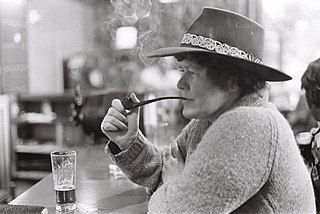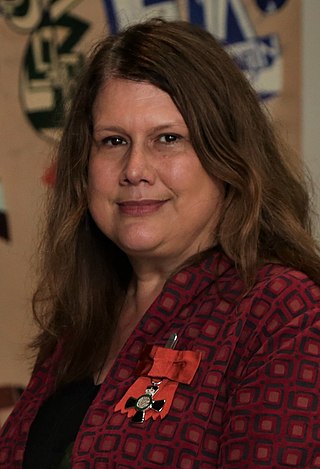Related Research Articles
Victoria University of Wellington is a public research university in Wellington, New Zealand. It was established in 1897 by Act of Parliament, and was a constituent college of the University of New Zealand.

New Zealand literature is literature, both oral and written, produced by the people of New Zealand. It often deals with New Zealand themes, people or places, is written predominantly in New Zealand English, and features Māori culture and the use of the Māori language. Before the arrival and settlement of Europeans in New Zealand in the 19th century, Māori culture had a strong oral tradition. Early European settlers wrote about their experiences travelling and exploring New Zealand. The concept of a "New Zealand literature", as distinct from English literature, did not originate until the 20th century, when authors began exploring themes of landscape, isolation, and the emerging New Zealand national identity. Māori writers became more prominent in the latter half of the 20th century, and Māori language and culture have become an increasingly important part of New Zealand literature.
Fleur Adcock was a New Zealand poet and editor. Of English and Northern Irish ancestry, Adcock lived much of her life in England. She is well-represented in New Zealand poetry anthologies, was awarded an honorary doctorate of literature from Victoria University of Wellington, and was awarded an OBE in 1996 for her contribution to New Zealand literature. In 2008 she was made a Companion of the New Zealand Order of Merit, for services to literature.

Keri Ann Ruhi Hulme was a New Zealand novelist, poet and short-story writer. She also wrote under the pen name Kai Tainui. Her novel The Bone People won the Booker Prize in 1985; she was the first New Zealander to win the award, and also the first writer to win the prize for a debut novel. Hulme's writing explores themes of isolation, postcolonial and multicultural identity, and Māori, Celtic, and Norse mythology.

Alfred Domett was the fourth premier of New Zealand, a close friend of the poet Robert Browning and author of the epic poem Ranolf and Amohia, a South Sea Day Dream. Born in England, he emigrated to New Zealand in 1842 and remained there for a further thirty years, holding many significant political posts.

William Manhire is a New Zealand poet, short story writer, emeritus professor, and New Zealand's inaugural Poet Laureate (1997–1998). He founded New Zealand's first creative writing course at Victoria University of Wellington in 1975, founded the International Institute of Modern Letters in 2001, and has been a strong promoter of New Zealand literature and poetry throughout his career. Many of New Zealand's leading writers graduated from his courses at Victoria. He has received many notable awards including a Prime Minister's Award for Literary Achievement in 2007 and an Arts Foundation Icon Award in 2018.

Jennifer Mary Bornholdt is a New Zealand poet and anthologist. She was New Zealand's Poet Laureate in 2005-2007.
"The Magpies" is the most famous poem by New Zealand poet Denis Glover (1912–1980). It helped define New Zealand's distinctive style of poetry. The poem was first published in Glover's 1964 anthology Enter Without Knocking.

Donna Tusiata Avia is a New Zealand poet and children's author. She has been recognised for her work through receiving a 2020 Queen's Birthday Honour and in 2021 her collection The Savage Coloniser won the Mary and Peter Biggs Award for Poetry at the Ockham New Zealand Book Awards. The Savage Coloniser and her previous work Wild Dogs Under My Skirt have been turned into live stage plays presented in a number of locations.
Lydia Joyce Wevers was a New Zealand literary historian, literary critic, editor, and book reviewer. She was an academic at Victoria University of Wellington for many years, including acting as director of the Stout Research Centre for New Zealand Studies from 2001 to 2017. Her academic research focussed on New Zealand literature and print culture, as well as Australian literature. She wrote three books, Country of Writing: Travel Writing About New Zealand 1809–1900 (2002), On Reading (2004) and Reading on the Farm: Victorian Fiction and the Colonial World (2010), and edited a number of anthologies.

Sir Vincent Gerard O'Sullivan was a New Zealand poet, short story writer, novelist, playwright, critic, editor, biographer, librettist, and academic. From 1988 to 2004 he was a professor of English literature at Victoria University of Wellington, and in 2013 he was appointed the New Zealand Poet Laureate.
Clifton Mark Williams is a New Zealand poet, writer, academic, critic, editor of contemporary New Zealand literature. He holds a MA (Hons) from the University of Auckland and a Ph.D (1983) from the University of British Columbia. He is emeritus Professor of English at Victoria University of Wellington.
Alfred Augustus Grace was a New Zealand teacher, journalist and writer. He was born in Auckland, Auckland, New Zealand on 1867. He wrote literature such as short stories, novels, folklore collections, and other literature that was read in New Zealand, Australia and England. Although he was known in his local communities for his contributions, he achieved nationwide fame for his writing. Grace wrote literature such as short stories and novels. Some of his famous literature was Maoriland stories, Tales of a dying race, and The tale of Timber Town. Grace majorly wrote stories that portray Maori cultures. His first major literature was called Maoriland stories that was published in 1895. He continuously wrote fiction until 1914 with The Tales of timber town as the last fiction literature that Grace wrote.
Harry Ricketts is a poet, biographer, editor, anthologist, critic, academic, literary scholar and cricket writer. He has written biographies of Rudyard Kipling and of a dozen British First World War poets.

Paula Jane Kiri Morris is a New Zealand novelist, short-story writer editor and literary academic. She is an associate professor at the University of Auckland and founder of the Academy of New Zealand Literature.

The International Institute of Modern Letters is a centre of creative writing based within Victoria University of Wellington. Founded in 2001, the IIML offers undergraduate and postgraduate courses and has taught many leading New Zealand writers. It publishes the annual Ōrongohau | Best New Zealand Poems anthology and an online journal, and offers several writing residencies. Until 2013 the IIML was led by the poet Bill Manhire, who had headed Victoria's creative writing programme since 1975; since his retirement, Damien Wilkins has taken over as the IIML's director.
J. Kēhaulani Kauanui is an American author, radio producer and professor. She is one of six co-founders of the Native American and Indigenous Studies Association (NAISA). A Kanaka Maoli woman, Kauanui was raised in California. She was awarded a Fulbright (1994-1995) at the University of Auckland in New Zealand where she was affiliated with the Māori Studies department. Her research areas focus on indigeneity and race, settler colonialism, decolonization, anarchism, and gender and sexuality.
Anna Jackson is a New Zealand poet, fiction and non-fiction writer and an academic.
Roger Allan Blackley was a New Zealand art historian, author, and curator. He was a noted authority on the work of artist C. F. Goldie.
Nicola Anne Hessell is a pakēhā New Zealand academic, and is a full professor at Victoria University of Wellington, specialising in British Romantic literature, and the intersection between Romantic literature and indigeneity.
References
- 1 2 "Jane Stafford - School of English, Film, Theatre, and Media Studies - Victoria University of Wellington". www.victoria.ac.nz.
- ↑ "Best New Zealand Poems now online". www.creativenz.govt.nz.
- ↑ Stafford, Jane (8 November 2018). "Let us now revisit Maoriland".
- ↑ "Colonial Literature and the Native Author - Indigeneity and Empire - Jane Stafford - Palgrave Macmillan". SpringerLink– via www.palgrave.com.
- ↑ "Previously unseen Katherine Mansfield poems discovered in US library". Stuff.
- ↑ Wevers, Lydia (11 February 2014). "Why New Zealand has no great 19th-century novel". The Conversation.